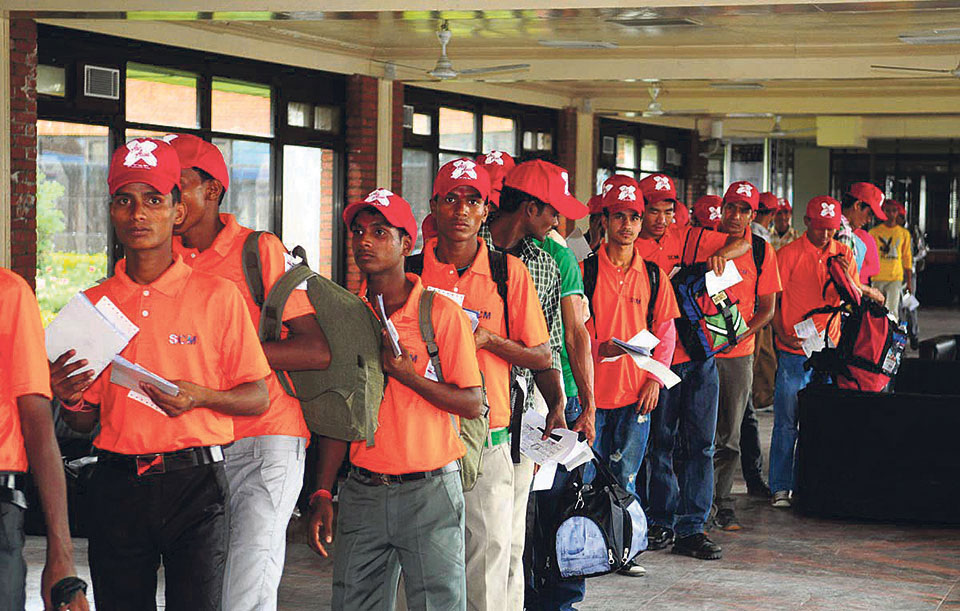
OR

We need laws to guarantee youth employment. But if such laws cannot deal with employment needs they become useless
“A man willing to work, and unable to find a work, is perhaps the saddest sight that fortune’s inequality exhibits under this sun,” says Thomas Carlyle, a British historian and novelist.
Workers play a crucial role in the country’s development. Thus it is essential that their welfare is promoted and protected through a fair, just and suitable labour administration system. A vibrant democracy should create employment opportunities, including self-employment.
Employment is the most essential right for a person to lead a dignified and comfortable life as jobs bring money, allow people to experience new ideas, build self-esteem and increase trust among themselves. This is why countries ensure employment to their citizens by enacting laws.
Nepal is the foremost country in South Asia to provide right to employment as a fundamental right in the constitution. Parliament of Nepal has enacted The Right to Employment Act (2018) to give effect to Article 33 of the constitution which grants fundamental right to the citizens to choose employment they want.
The preamble of the Act states that employment will be ensured to every citizen. But there are some provisions which have potential to frustrate the objective the legislation intends to achieve. Let me discuss some of them here.
Shortcomings of law
Section 11(2) of the Act empowers the Employment Service Centre (ESC), which is to be established by the Government of Nepal to prepare a list of ‘actual’ unemployed persons from the list of total applicants. This is fraught with challenges because even the employed persons might project themselves as ‘unemployed’ while making application at ESC.
The Act does not provide any clear provision outlining the basis on which the list of actual unemployed persons will be prepared. It could be used and misused by the party in power to limit the job opportunities only to their cadres. Likewise, the Act is silent on for how long and when the applicants will get the job.
Section 11(3) of the Act envisages that the ESC will submit its reports to the provincial government as well. Again Section 10(2) provides that the ESC will work on the aid and recommendation from the central government. Thus this law confers ample discretionary powers on the central government to formulate employment policies. This goes against the principles of federalism.
Section 13 confers power on the local bodies to prepare a list of employers under their jurisdiction. How will they do so? What if they exclude those employed in informal sectors? As is the case, child labor is in practice in Nepal. Under which categories will the local bodies place such children? If the local bodies come to know of employers hiring minors, they should initiate lawsuit against them. But will they do so?
The Act provides that central and respective provincial and local governments will allocate budget but it does not empower the provincial governments to play any constructive role with ESC and participate in formulating employment policies. In doing so, the Act only seeks budgets from the provincial government but does not secure their concerns. Also it is silent on the ratio in which the budget will be shared among the three tiers of government.
There is nothing to stabilize and stop outflow of migrant workers. Remittances are the foundation of Nepal’s economy, constituting about one-third of the GDP, sustaining the national economy as well adding to household incomes. For a nation whose national economy depends highly on remittance, the employment laws should have the provisions whereby the state will be obliged to create job opportunities and business environment within the country. Foreign employment is not a permanent solution to Nepal’s unemployment problem.
Indeed, we need laws to guarantee youth employment. But if such laws cannot deal with employment needs they become useless.
Nepal has ratified both Universal Declaration of Human Rights (UDHR) and International Covenant on Economic, Social and Cultural Rights (ICESCR), the conventions related to right to work. The constitution also safeguards this right. Thus it is the obligation of the state to abide by the constitutional provision. The case of India, however, is different. There the constitution does not expressly recognize the ‘right to work’ as a fundamental right. It is placed under Directive Principles. The right to work became a fundamental right through judicial activism. In the landmark judgment of Olga Tellis and others v Bombay Municipal Corporation and others (AIR 1986), the apex court held that right to work is a sacrosanct fundamental right inherent in right to life and liberty clause of Article 21 of Indian constitution.
Create jobs
Despite these legal arrangements, youth unemployment and outflow of migrant workers is perennial problem for India. So is the case with Nepal. Owing to lack of employment prospects, the youths today either live with apprehension of unemployability or they leave the country to find jobs overseas.
Troublingly, our education system has created an army of unemployable graduates. If the educational institutions impart skill-based learning they would help bring a positive change in the society. Job creation is the only solution to unemployment problems facing the country. Mere enactment of laws won’t help.
The author is a guest faculty at Kathmandu University School of Law
You May Like This

Ready to work
There seems to be a huge gap between what the industry is looking for and what the colleges and universities... Read More...

Tourism can create job opportunities: CM Paudel
MAKAWANPUR, Oct 11: Chief Minister of Province 3, Dormani Paudel, on Wednesday stressed on the importance of tourism sector for the... Read More...










Just In
- Heavy rainfall likely in Bagmati and Sudurpaschim provinces
- Bangladesh protest leaders taken from hospital by police
- Challenges Confronting the New Coalition
- NRB introduces cautiously flexible measures to address ongoing slowdown in various economic sectors
- Forced Covid-19 cremations: is it too late for redemption?
- NRB to provide collateral-free loans to foreign employment seekers
- NEB to publish Grade 12 results next week
- Body handover begins; Relatives remain dissatisfied with insurance, compensation amount








Leave A Comment